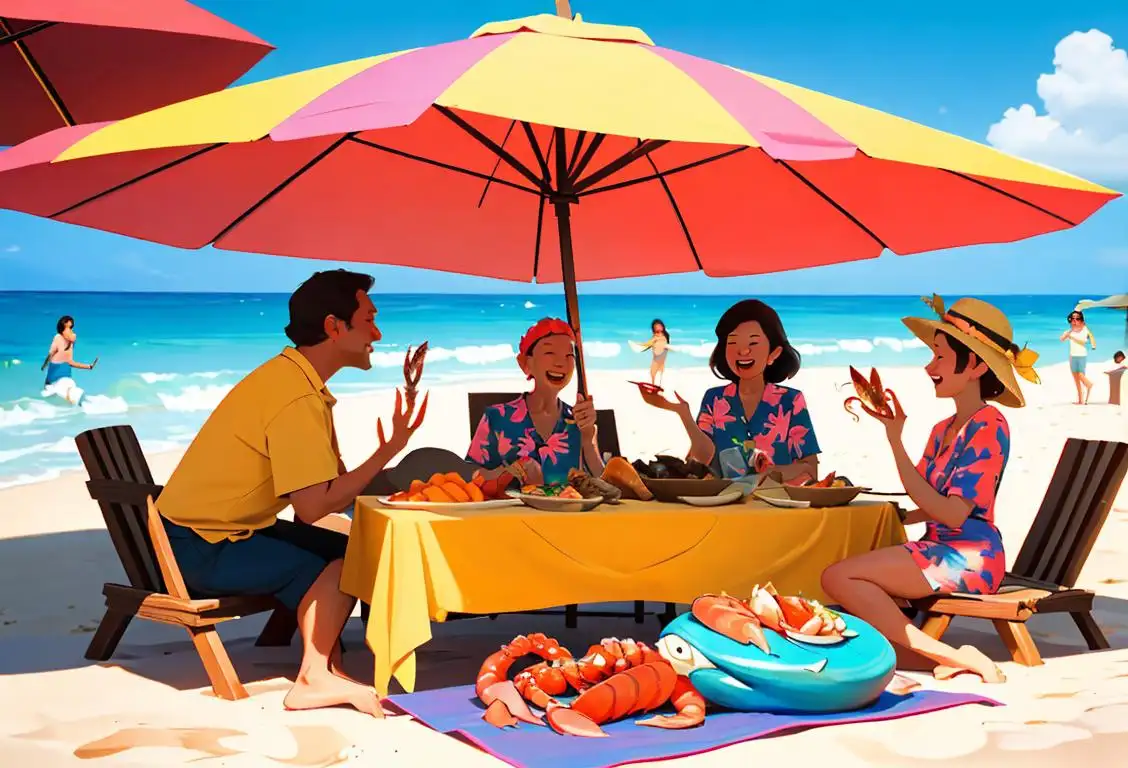National Sustainable Seafood Day

Hey there seafood enthusiasts! Get ready to dive into the deep blue sea of National Sustainable Seafood Day. This fin-tastic day is all about celebrating the wonders of sustainable seafood and raising awareness about the importance of protecting our oceans. So put on your best seafood bib and prepare to feast your eyes on some deliciously sustainable goodness!
When is Sustainable Seafood Day?
It's national sustainable seafood day on the 9th May.
The Origin of National Sustainable Seafood Day
National Sustainable Seafood Day emerged from the depths of the internet on May 9, 2015. With 162 mentions online, this day made a splash in the online world, captivating the attention of seafood lovers everywhere.
Why Sustainable Seafood is the Catch of the Day
Sustainable seafood refers to fish and shellfish caught or farmed using practices that minimize environmental impact and ensure the long-term viability of marine ecosystems. By choosing sustainable seafood, you're not only satisfying your taste buds but also helping to protect our oceans for future generations.
A Seafood Feast Fit for a King
On this special day, why not treat yourself to a mouthwatering seafood feast sourced from sustainable fisheries? From succulent shrimp to delectable salmon, there are plenty of eco-friendly options to tantalize your taste buds. So grab your loved ones, put on your chef hat, and whip up a seafood extravaganza that would make Poseidon himself jealous!
Fun Facts About Sustainable Seafood
Did you know that oysters are not only a delightful treat but also environmental superheroes? These bivalves help filter and clean the ocean water, making them great allies in the battle against pollution. Talk about a double shell of awesomeness!
History behind the term 'Sustainable Seafood'
1997
Redefining Fisheries Sustainability
In 1997, the Food and Agriculture Organization of the United Nations (FAO) defined the concept of sustainable seafood. It was introduced as a way to balance the economic benefits of fishing with the conservation and preservation of marine resources. The definition emphasized the need for responsible fishing practices that would ensure the long-term viability of fish populations and the aquatic ecosystems they inhabit.
1990
The Birth of Sustainable Seafood
The term 'sustainable seafood' was first coined in 1990, when the concept of sustainability began gaining traction in environmental discussions. It emerged as a response to the growing concerns about the depletion of fish stocks and the negative impacts of overfishing on the world's oceans. Sustainable seafood refers to seafood that is caught or farmed in a way that ensures its availability for future generations.
1997
Redefining Sustainability
In 1997, the concept of sustainable seafood began to gain traction as marine conservation organizations, such as the Marine Conservation Society, redefined the term 'sustainability' to include the long-term health of fish populations and the ecosystem they inhabit. This shift in focus marked the beginning of a new approach to fishing and consumption.
1997
The Beginning of Sustainability in Seafood
The term 'sustainable seafood' first came into prominence in 1997 with the establishment of the Marine Stewardship Council (MSC). The MSC is a non-profit organization that was founded to address the growing concerns over the environmental impact of fishing practices. They developed a certification program that would ensure seafood products were harvested in a sustainable manner, taking into account factors such as fish stocks, habitat impact, and management systems.
1997
The Marine Stewardship Council's Certification Program
In 1997, the Marine Stewardship Council (MSC) introduced its certification program to promote sustainable fishing practices. The MSC developed rigorous standards for sustainable fishing, covering aspects such as management of fish stocks, minimizing environmental impacts, and ensuring effective governance. By certifying fisheries that meet these standards, the MSC plays a significant role in driving the adoption of sustainable seafood practices worldwide.
2002
The Rise of Sustainable Seafood Awareness
In 2002, the World Summit on Sustainable Development held in Johannesburg, South Africa, brought global attention to the concept of sustainable seafood. During the summit, discussions were held regarding the depletion of fish stocks and the need for responsible fishing practices. This further fueled the demand for sustainable seafood and encouraged various organizations, businesses, and governments to take action.
1999
Marine Stewardship Council (MSC) Formation
In 1999, the Marine Stewardship Council (MSC) was established to provide an independent certification and labeling program for sustainable seafood. The MSC works to assess and certify fisheries that meet their rigorous standards for sustainability. This was a significant milestone in creating a market-driven demand for sustainably sourced seafood, as consumers could now identify and choose products carrying the MSC certification label.
2000
The Birth of Seafood Watch
In the year 2000, the Monterey Bay Aquarium launched the Seafood Watch program to help consumers make sustainable seafood choices. The program provides recommendations on which types of seafood are fished or farmed in an environmentally friendly manner. It also raises awareness about overfishing and promotes responsible fishing practices.
2006
Creation of Seafood Sustainability Programs
The year 2006 marked the establishment of prominent seafood sustainability programs, such as the Marine Conservation Society's Good Fish Guide and the Monterey Bay Aquarium's Seafood Watch. These programs aimed to educate consumers and provide them with resources to make sustainable seafood choices. They developed comprehensive guides and rating systems that categorized seafood based on their environmental impact, helping consumers make informed decisions.
2002
Emergence of Certification Programs
In 2002, various certification programs began to emerge to protect the sustainability of seafood. One notable example is the Marine Stewardship Council (MSC) which focuses on certifying fisheries that meet specific criteria for sustainability. The introduction of these certification programs helped establish guidelines and standards for sustainable fishing practices.
2002
The World Summit on Sustainable Development
The World Summit on Sustainable Development held in Johannesburg, South Africa, in 2002 marked a major milestone for the global recognition of sustainable seafood. During the summit, the importance of sustainable fisheries and the need for international cooperation to achieve it were highlighted. This event brought sustainable seafood to the forefront of international discussions and fostered a sense of urgency for its implementation.
2002
Monterey Bay Aquarium's Seafood Watch Program
The year 2002 marked the launch of the Monterey Bay Aquarium's Seafood Watch program. This initiative aimed to educate and empower consumers, chefs, and seafood suppliers about making sustainable seafood choices. The program provides region-specific recommendations and ratings for different types of seafood based on their environmental impact. By raising awareness and providing accessible information, the Seafood Watch program has played a vital role in shaping public attitudes and driving the demand for sustainable seafood.
2005
Global Seafood Sustainability Initiative (GSSI)
In 2005, the Global Seafood Sustainability Initiative (GSSI) was established with the objective of creating a common benchmark for seafood certification programs worldwide. The GSSI works toward harmonizing different sustainability schemes and promoting transparency and credibility within the seafood supply chain. Their efforts have helped simplify the process for fisheries and businesses seeking certification, ensuring consistency and reliability in sustainable seafood practices.
2010
Global Collaboration for Sustainable Seafood
In 2010, the United Nations Food and Agriculture Organization (FAO) released the 'Guidelines for the Eco-labeling of Fish and Fishery Products from Marine Capture Fisheries.' These guidelines aimed to establish international standards for eco-labeling and ensure the credibility of sustainable seafood claims. The release of these guidelines aligned various countries' efforts and promoted global collaboration in promoting sustainable seafood practices.
2003
Seafood Watch Program Launch
In 2003, the Monterey Bay Aquarium in California launched the Seafood Watch program. This program aimed to raise consumer awareness about sustainable seafood choices and provide information to help people make informed decisions when buying seafood. The Seafood Watch program emphasizes the importance of supporting fisheries and aquaculture practices that minimize environmental impacts and protect threatened species.
2006
Promoting Sustainable Fisheries on a Global Scale
By 2006, the issue of sustainable seafood gained global attention. The United Nations Food and Agriculture Organization (FAO) released guidelines on sustainable fisheries, emphasizing the need for responsible fishing and effective management. This step marked a significant effort towards promoting sustainable fishing practices worldwide.
2013
Sustainable Seafood Goes Mainstream
By 2013, the concept of sustainable seafood had gained significant traction and had become a mainstream concern. Major retailers, restaurants, and seafood suppliers started prioritizing sustainable sourcing and labeling their products accordingly. This shift in consumer demand and industry practices further encouraged responsible fishing practices and led to a broader range of sustainably sourced seafood options for consumers.
2010
Consumer Education and Awareness
In 2010, major restaurant chains and retailers began to prioritize sustainable seafood. Consumer education and awareness campaigns, such as the 'Know Your Fish' movement, helped people understand the importance of making sustainable seafood choices. The rise of sustainable seafood in the market demonstrated the growing demand and influence of consumers in shaping the fishing industry.
2008
A Global Movement: World Oceans Day
The increasing awareness of the critical state of our oceans led to the establishment of World Oceans Day by the United Nations in 2008. This annual event, celebrated on June 8th, serves as a global platform to promote ocean conservation and sustainable seafood practices. World Oceans Day showcases the importance of preserving marine ecosystems and encourages individuals, organizations, and governments to take action.
2010
United Nations Sustainable Development Goals
The United Nations included sustainable fisheries and marine resource management as part of their Sustainable Development Goals (SDGs) in 2010. Under SDG 14, nations committed to conserving and sustainably using the oceans, seas, and marine resources. This international recognition further emphasized the importance of sustainable seafood practices as not just an environmental concern but also a global agenda for achieving long-term balance and equity.
2021
Continued Focus on Sustainable Seafood
To this day, the term 'sustainable seafood' continues to be a key topic of discussion and action within the seafood industry. Various organizations, governments, and consumers are actively engaged in promoting sustainability, implementing eco-certification programs, and advocating for responsible fishing practices. The concept of sustainable seafood serves as a reminder of the importance of protecting marine ecosystems and ensuring the long-term viability of seafood resources.
Present
Growing Consumer Demand and Industry Initiatives
In recent years, there has been a growing awareness and demand for sustainable seafood among consumers. People are increasingly making conscious choices to support fisheries and seafood suppliers that prioritize sustainability. Numerous industry initiatives, partnerships, and labeling programs continue to develop, providing consumers with more transparency and access to responsibly sourced seafood. This push for sustainability has not only benefited our oceans but has also created a positive impact on the livelihoods of fishing communities and the overall health of marine ecosystems.
2013
Global Commitment to Sustainable Seafood
In 2013, the World Trade Organization (WTO) implemented the Agreement on the Application of Sanitary and Phytosanitary Measures (SPS Agreement), which includes measures for the conservation of fishery resources and the promotion of sustainable fishing practices. This agreement showcased a global commitment to safeguarding the future of seafood and ensuring its sustainability.
Did you know?
Did you know that consuming sustainable seafood supports the livelihoods of fishermen and coastal communities around the world? By enjoying a delicious seafood meal, you're also helping to sustain the people who bring us these oceanic delights.Tagged
awareness food funFirst identified
12th March 2015Most mentioned on
9th May 2015Total mentions
162Other days
Sweet Tea Day
Agriculture Day
Cheese Pizza Day
Bacon Day
Pumpkin Day
Medal Of Honor Day
Vodka Day
Foundation Day
Guac Day
Wing Day









